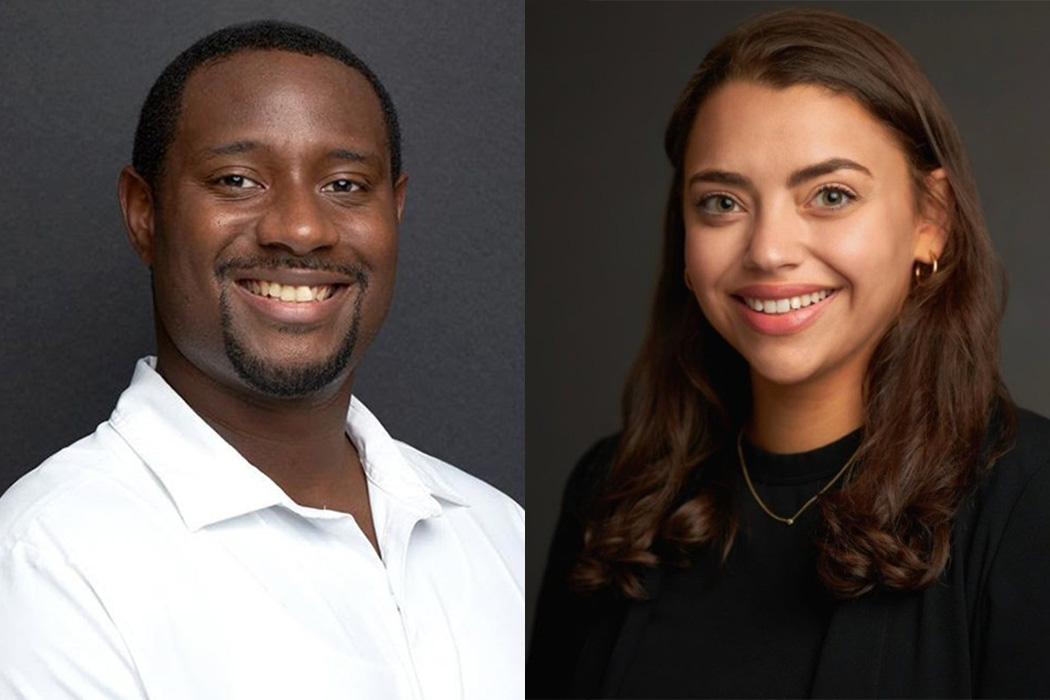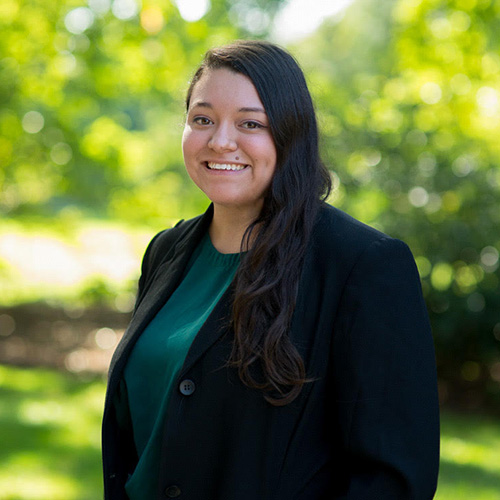
From left to right: Doctoral students Charles Currie and Sophia Eisenberg
Charles Currie, Ph.D.’25, and Sophia Eisenberg, Ph.D.’27, have received $5,000 fellowships from the Boston College School of Social Work to honor their past achievements and support their future research.
Currie won the Elaine Pinderhughes Fellowship, which is awarded annually to an outstanding Black doctoral student, while Eisenberg won the Carolyn B. Thomas Fellowship, which is given every year to a doctoral student whose scholarship focuses on children and families.
Currie plans to use the funding from his fellowship to support his dissertation, with a particular focus on hiring research assistants and purchasing statistical software to aid his study.
He says his research project will shed light on what life is like for young people in Sierra Leone who have spent time in residential care before leaving and transitioning into independent adulthood.
The study, he says, would mark the first time that any scholar has explored the well-being of so-called “care leavers” in the West African country. And his findings, he adds, could serve as a jumping off point to develop metrics to determine what young people in residential care need to succeed on their own.
“The hope is that this would be a groundbreaking study of care leavers in Sierra Leone,” says Currie, whose fellowship is named in honor of Elaine Pinderhughes, a Professor Emerita who chaired BCSSW’s clinical program. “Hopefully it will lead to more replicable models for preparing young people to leave care.”
His research will build on his three-year stint at The Raining Season, a nonprofit that strives to provide hopeful futures for vulnerable children in Sierra Leone. From 2017 to 2020, Currie developed a program that prepared youth living in a residential care home at the nonprofit to reach their potential.
A few of the young people in the program went on to learn a trade, he says, while many others enrolled in college. One young woman is now in her final year of a bachelor of social work program in the capital city of Sierra Leone.
Currie hopes that some of the youth who participated in the program will be able to contribute to his study, particularly the student studying social work.
“It would be a dream to add a participatory element to my dissertation project and to have her and a few others contribute to the questions that are being asked or to even help analyze the data,” says Currie, who will begin his fourth and final year in the doctoral program this fall. “Ultimately,” he adds, “my aim is to serve those young people and the many others like them around the world in whatever ways I can.”
Eisenberg, a rising second-year doctoral student, is currently working with BCSSW Professor Catherine Taylor, a public health researcher who studies ways to prevent child abuse. In particular, Eisenberg is analyzing quantitative data for a randomized controlled trial focused on implementing parenting interventions to prevent the maltreatment of children.
While her precise plans to use her fellowship money are to be determined, she knows that she wants to continue studying the health and well-being of kids and families. She is particularly interested in working to reduce the rates of violence among youth with disabilities, who are three to four times more likely to experience violence and neglect than other children.
“I really want to look at how parenting buffers the association between community violence, exposure to violence, and neurocognitive outcomes in early childhood,” says Eisenberg, whose fellowship was established in 1989 by Carolyn B. Thomas, a longtime BCSSW professor who chaired the doctoral program.
Eisenberg cultivated her interest in this area of study while working at a public charter school on the South Side of Chicago. As a special education teacher and case manager from 2017 to 2021, Eisenberg designed reading courses, managed a caseload of 30 students a year with Individualized Education Plans, and got a close look at how exposure to gun violence affected the mental health of her pupils.
She followed up her experience at the charter school by working for the Office of the Mayor of Chicago, where she evaluated three violence prevention programs within the city’s Department of Family Support Services. It was then, while she was enrolled in the M.S.W. program at the University of Chicago, that she applied to BCSSW’s doctoral program.
“The violence prevention work I did in Chicago was very much ingrained in public health, and I liked how much public health focus there was among the professors at BCSSW,” says Eisenberg. “Through my work in Chicago, I also realized that I wanted my research to focus more on early childhood even though I had more experience in older adolescents and young adults.”
Both Currie and Eisenberg say that they want to become tenure-track professors, working to train the next generation of social workers to solve some of the world’s most pressing social problems.
Their fellowships, they say, bring them one step closer to achieving their career goals.
“This award is a catalyst for my development as well as for improving the well-being of folks who will be served by my work,” says Currie.
As Eisenberg puts it: “This fellowship solidifies my commitment to working with children and families long term. I think it’s easier to focus solely on children or families, but I hope to continue to look at them in tandem along with other ecological factors that affect health and well-being.”




